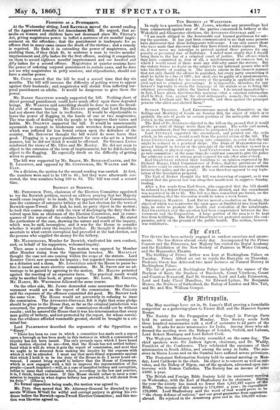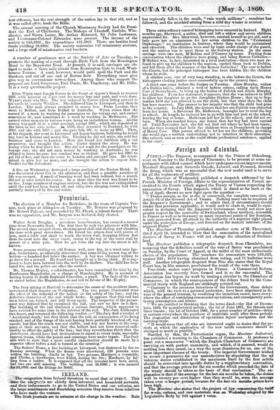tr 31rtrupplio.
The May meetings have set in, St. James's Hall proving a formidable competitor as a gathering-place to Exeter Hall and the Hanover Square Rooms.
The Society for the Propagation of the Gospel in Foreign Parts held its annual meeting on Monday. This Society sends forth three hundred missionaries with a staff of assistants to all parts of the world. It asks for more missionaries for India. Among those who ad- dressed the meeting were the Bishops of London, Oxford, and Labuan, Lord Robert Montague and Lord Robert Cecil.
The Wesleyan Missionary Society assembled on the same day. The chief speakers were Sir Andrew Agnew, chairman, and Dr. Waddy, President of the Conference. They celebrated the successes of their missionaries in South Africa, and among the army in India. The mis- sions in Sierra Leone and on the Gambia have suffered severe privations.
The Protestant Reformation Society held its annual meeting on Mal. day, Lord Calthorpe in the chair. Its object is to convert as well as con- vince, and the Bishop of Ripon, one of the speakers, advocated open con- troversy with Roman Catholics. The Society has an income of some 45001. a year. The British and Foreign Bible Society held its anniversary meeting on Wednesday, with the Earl of Shaftesbury for its chairman. During the year the society has issued no fewer than 1,917,897 copies of the Bible. The income of this society is 173,000/. a year ; its expenditure 179,0001. Lord Shaftesbury said the word of God would prove to be "the cheap defence of nations," and our great guarantee from aggression abroad. He rejoiced in the Armstrong guns and in the 100,000 volun- teen riflemen, but the real strength of the nation lay in that old, and as it was called effete, book the Bible.
The annual meeting of the Church Missionary Society had for Presi- dent the Earl of Chichester. The Bishops of Llandaff, Carlisle, Win- chester, and Sierra Leone, Mr. Arthur Kinnaird, Sir John Lawrence, and Lieutenant-Colonel Edwardes were present. The income of the society is 145,6291., the expenditure 137,5821. There are besides local funds yielding 18,000/. The society maintains 142 missionary stations, and a large staff of missionaries and teachers.
A number of gentlemen met at the Society of Arts on Tuesday, to promote the making of a road through Hyde Park from the Kensington Road to the Bayswater Road. At present, it is said, carriages are ob- liged to make a three mile circuit from Kensington Gate to reach West- bourne Terrace. A road, however, would quite spoil the Park and the Gardens, and cut off one end of Rotten Row. Everything must give give way to convenience now-a-days. Among those who support the proposal are Lord Grosvenor, Earl Ducie, Mr. Thackeray, and Mr. Dilke. It is a very questionable project.
Eliza Wynn sued Joseph Carter in the Court of Queen's Bench to recover 2001. with interest at 5 per cent for money lent and paid, and work done. Wynn's story was this. She was seduced by Carter when living servant to his uncle in county Wicklow. She followed him to Liverpool, and then to London. The man always promised to marry her. From London. they went to Belfast, and from Belfast to Australia. Wynn states that she earned 21. a week by washing for passengers on the voyage out, and earned sometimes 3/., and sometimes 41. a week by washing m Melbourne. She earned other moneys in various ways, being an industrious woman. All the money was paid in to a joint account, except 1001., which she deposited at the bank in her own name. Ia 1858, they returned to England, he with '
590/. and she with 100/. • and she gave him 10/. to make up 6001. Then, at his request, she went to Liverpool and began business, believing he would buy. land in Ireland and marry her. Finding he did not write, she sold her business and came to London. Here she found her faithless ally a cab proprietor, and brought this action. Carter denied the story. He was young when he first knew her. She did not wash for the passengers on the voyage out ; she did not earn money by washing in Australia; he was obliged to leave because her conduct was so violent. He gave her 100/. to get rid of her, and then she came to London and annoyed him. He deter- mined to give her no more and she brought the action to expose him. 'Verdict for the defendant.
A fire, on Wednesday, destroyed a large portion of the Euston Hotel. It was discovered about five in the afternoon, and thus a possible sacrifice of life was escaped. A smell of burning wood had been noticed, but a search did not at once detect its source. In a short time the roof was found to be on fire. Large numbers of engines arrived, but the fire was not extinguished until the roof had been burnt off, and sixty-two sleeping rooms had been partially destroyed by fire and water.



























 Previous page
Previous page